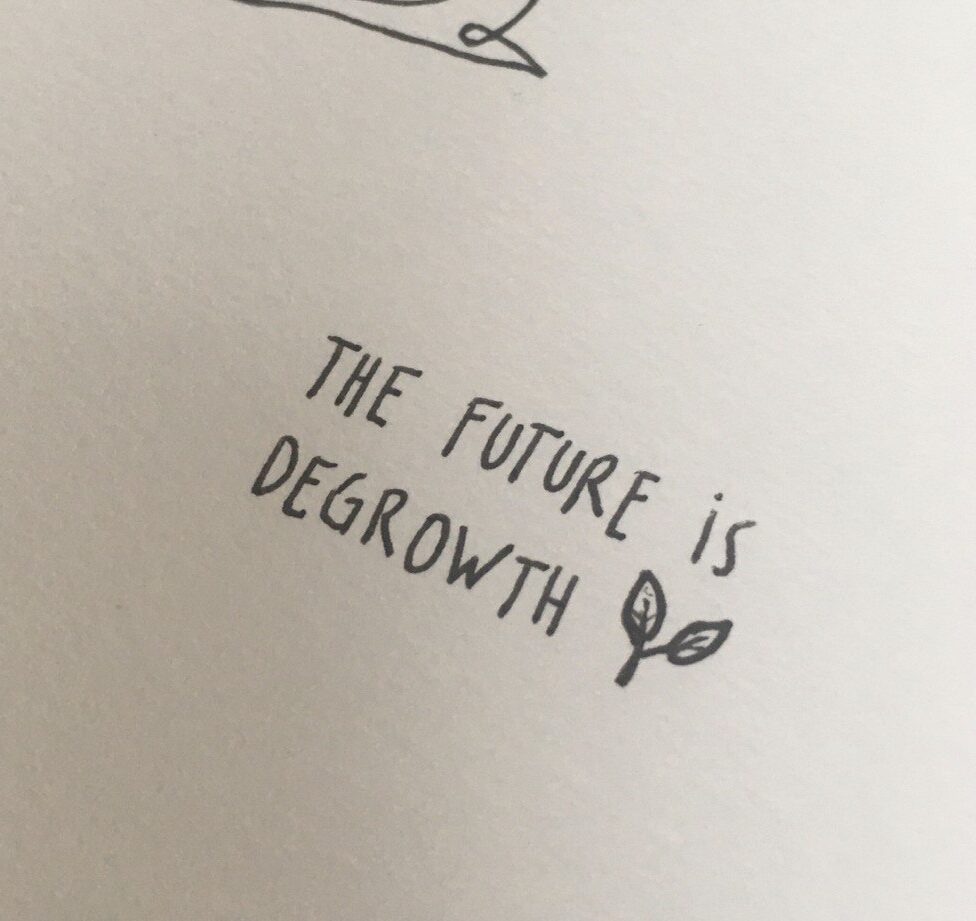On Monday 15 May, as EU policymakers gather for the first day of the landmark 2023 Beyond Growth conference at the European Parliament, over 400 experts call for political leaders to seize this opportunity to tackle interconnected social, environmental and political crises and embrace a wellbeing economy that allows humanity and the planet to thrive, not just survive.
This open letter is signed by over 400 academics and NGOs and lays out the case for moving away from a fixation on unsustainable growth-driven economic systems. It also makes recommendations on how policymakers can build an alternative that promotes democracy, justice, equality and meets the climate targets of the Paris Agreement and the European Green Deal.
A post-growth Europe critical to survive and thrive, urge over 400 civil society groups and experts
Authored by: Friends of the Earth Europe, Timothée Parrique, European Environmental Bureau, Kate Raworth, European Youth Forum, Vincent Liegey, Wellbeing Economy Alliance
Signed by, among others: Olivier De Schutter, Milena Buchs, Giorgos Kallis, Eloi Laurent, Robert Costanza, Ekaterina Chertkovskaya, Jason Hickel, Julia Steinberger, Dominique Méda, Camille Étienne, Adélaïde Charlier, Federico Demaria, Sandrine Dixson-Declève, Nick Fitzpatrick, Tim Jackson
As political leaders gather for a second conference at the European Parliament on how to move “beyond growth”, we, the undersigned academics and civil society organisations, see the geopolitical crisis as an opportunity to disengage from the socially and ecologically harmful growth competition and instead embrace a wellbeing cooperation.
There is no empirical basis indicating that it is possible to globally and sufficiently decouple economic growth from environmental pressures. The pursuit of endless economic growth by high income nations is a problem as it either reduces or cancels the outcomes of environmental policies. The current climate chaos and unravelling web of life on which our society depends is an existential threat to peace, water and food security, and democracy.
Advancing to a post-growth economy is not only to survive, but also to thrive. This calls for a democratically planned and equitable downscaling of production and consumption, sometimes referred to as ‘degrowth’, in those countries that overshoot their ecological resources. This is Europe’s global peace project, because its current economic growth is causing conflicts both in and beyond Europe.
As political leaders gather for a second conference at the European Parliament on how to move “beyond growth”, we, the undersigned academics and civil society organisations, see the geopolitical crisis as an opportunity to disengage from the socially and ecologically harmful growth competition and instead embrace a wellbeing cooperation.
There is no empirical basis indicating that it is possible to globally and sufficiently decouple economic growth from environmental pressures. The pursuit of endless economic growth by high income nations is a problem as it either reduces or cancels the outcomes of environmental policies. The current climate chaos and unravelling web of life on which our society depends is an existential threat to peace, water and food security, and democracy.
Advancing to a post-growth economy is not only to survive, but also to thrive. This calls for a democratically planned and equitable downscaling of production and consumption, sometimes referred to as ‘degrowth’, in those countries that overshoot their ecological resources. This is Europe’s global peace project, because its current economic growth is causing conflicts both in and beyond Europe.
In the context of high-income nations, a smaller footprint does not mean worse living conditions. Sufficiency policies focusing on frugality, resource reduction, and work time reduction can significantly increase wellbeing and decrease environmental pressures, therefore creating the possibility for sustainable prosperity without growth.
In order to ensure the highest quality of life with the lowest footprint, we must completely change the goals and rules of the economic game. In a post-growth economy, the current focus on quantitative growth would be replaced by the aim of thriving in a regenerative and distributive economy, one that delivers qualitative wellbeing by meeting the needs of all people within the means of the living planet – as elaborated in the framework of Doughnut Economics.
The markets have proven to be ill-equipped to make the most crucial decisions in our society. For the economy to serve the people, rather than the other way around, people must be given back control over the economy. To change the rules of the game, we need to learn from already existing initiatives. For example, upscaling across the EU the model for not-for-profit cooperatives.
In light of these pressing challenges and stimulating opportunities, we call on the European Union, its Institutions, and Member States to implement:
- Post-growth European Institutions: constitute permanent structures at the Commission, the Council, the Parliament, and within Member States to assess post-growth strategies and pathways.
- A European Green Deal beyond growth: design a new flagship programme shaped around a systemic change approach that aspires to create a thriving future within planetary boundaries, with degrowth as a necessary transition phase towards a post-growth destination.
- Beyond growth policies based on the four principles of:
- Biocapacity: fossil fuel phase-outs, limits to raw material extraction and nature protection and restoration measures for healthy and resilient soils, forests, marine and other ecosystems. E.g., a Fossil Fuel Non-Proliferation Treaty, a Resource Justice and Resilience Act including a binding material footprint reduction target and real, area-based nature restoration.
- Fairness: fiscal instruments to foster a more equal society by eradicating income and wealth extremes, as well as super-profits. E.g., a carbon wealth tax, both minimum and maximum incomes.
- Wellbeing for all: secured access to essential infrastructures via an improved, ecologically-sensitive welfare state. E.g., Universal Basic Services (including the human rights to health, transport, care, housing, education and social protection etc.), job guarantees, price controls for essential goods and services.
- Active democracy: citizen assemblies with mandates to formulate socially acceptable sufficiency strategies and strengthen policies based on ecological limits, fairness and wellbeing for all and a stronger role for trade unions. E.g., local needs forum, climate conventions, participatory budgeting.
It has been five years since the first “post-growth” conference. Within civil society and academia, growth-critical ideas have been getting ever stronger. The details of these ideas are being discussed in the European Parliament and with the European Commission right now. Scientific knowledge and policy insights are available to make the ideas of degrowth and post-growth a reality. The crises we face are also opportunities to create a new system that can secure wellbeing for all while allowing for a thriving democratic life and a slower yet sweeter mode of living.
References
- Fitzpatrick, Nick, Timothée Parrique, and Inês Cosme. 2022. “Exploring degrowth policy proposals: A systematic mapping with thematic synthesis.” Journal of Cleaner Production 365: 132764. https://doi.org/10.1016/j.jclepro.2022.132764
- Fanning, Andrew L., Daniel W. O’Neill, Jason Hickel, and Nicolas Roux. 2022. “The social shortfall and ecological overshoot of nations.” Nature Sustainability 5: 26-36. https://doi.org/10.1038/s41893-021-00799-z
- Kallis, Giorgos, Vasilikis Kostakis, Steffen Lange, Barbara Muraca, Susan Paulson, and Matthias Schmelzer. 2018. ”Research On Degrowth.” Annual Review of Environment and Resources 43: 291-316. https://doi.org/10.1146/annurev-environ-102017-025941
- Hickel, Jason, and Giorgos Kallis. 2019. “Is Green Growth Possible?” New Political Economy 25: 469-486. https://doi.org/10.1080/13563467.2019.1598964
- Hirvilammi, Tuuli, and Max Koch. 2020. “Sustainable Welfare beyond Growth.” Sustainability 12(5): 1824. https://doi.org/10.3390/su12051824
- Hickel, Jason. 2020. “What does degrowth mean? A few points of clarification.” Globalizations 18(7): 1105-1111. https://doi.org/10.1080/14747731.2020.1812222
- McGreevy, Steven R., Christoph D. D. Rupprecht, Daniel Niles, et al. 2022. “Sustainable agrifood systems for a post-growth world.” Nature Sustainability 5: 1011-1017. https://doi.org/10.1038/s41893-022-00933-5
- Demaria Federico, François Schneider, Filka Sekulova, and Joan Martinez-Alier.
- “What is Degrowth? From an Activist Slogan to a Social Movement.” Environmental Values 22(2): 191-215. https://www.jstor.org/stable/23460978
- Keyßer, Lorenz T., and Manfred Lenzen. 2021. “1.5 °C degrowth scenarios suggest the need for new mitigation pathways.” Nature Communications 12: 2676. https://doi.org/10.1038/s41467-021-22884-9
- Mastini, Riccardo, Giorgos Kallis, Jason Hickel. 2021. “A Green New Deal without growth?” Ecological Economics 179: 106832. https://doi.org/10.1016/j.ecolecon.2020.106832
- Vogel, Jefim, Julia K. Steinberger, Daniel W. O’Neill, William F. Lamb, Jaya Krishnakumar. 2021. “Socio-economic conditions for satisfying human needs at low energy use: An international analysis of social provisioning.” Global Environmental Change 69: 102287. https://doi.org/10.1016/j.gloenvcha.2021.102287
- Creutzig, Felix, Leila Niamir, Xuemei Bai, et al. 2022. “Demand-side solutions to climate change mitigation consistent with high levels of well-being.” Nature Climate Change 12: 36-46. https://doi.org/10.1038/s41558-021-01219-y
- Jackson, Tim, and Peter A. Victor. 2019. “Unraveling the claims for (and against) green growth.” Science 366(6468): 950-951. https://doi.org/10.1126/science.aay0749
- Jackson, Tim. 2019. “The Post-growth Challenge: Secular Stagnation, Inequality and the Limits to Growth.” Ecological Economics 156: 236-246. https://doi.org/10.1016/j.ecolecon.2018.10.010
- Walker, Christine Corlet, Angela Druckman, Tim Jackson. 2021. “Welfare systems without economic growth: A review of the challenges and next steps for the field.” Ecological Economics 186: 107066. https://doi.org/10.1016/j.ecolecon.2021.107066
- Jackson, Tim, Peter A. Victor. 2021. “Confronting inequality in the “new normal”: Hyper-capitalism, proto-socialism, and post-pandemic recovery.” Sustainable Development 29(3): 504-516. https://doi.org/10.1002/sd.2196504-516.

